Introduction to WhatsApp Marketing for Political Campaigns
In today’s digital age, effective communication is essential for political campaigns. WhatsApp Marketing for Political Campaigns offers a direct and personal approach to engaging voters, making it an invaluable tool for political strategists. As a widely used messaging platform, WhatsApp allows campaigns to reach constituents quickly and efficiently, fostering a deeper connection with the electorate.
The platform’s popularity, with millions of active users globally, ensures that messages can reach a broad audience with minimal effort. Campaigns can share updates, important announcements, and event details directly through one-on-one messages or group chats, increasing the likelihood that voters will see and engage with the content.
Furthermore, WhatsApp supports multimedia content, enabling campaigns to share videos, images, and documents that can enhance the storytelling aspect of their messaging. This rich format can help illustrate a candidate’s vision and policies more vividly than text alone.
As campaigns strive to cultivate a sense of community, WhatsApp provides the tools to create engaging discussions among supporters and potential voters. Ultimately, leveraging WhatsApp in political marketing not only strengthens voter relationships but also empowers campaigns to build grassroots movements that can lead to increased voter turnout and engagement.
Benefits of Using WhatsApp in Political Campaigns
WhatsApp offers numerous advantages in political campaigns:
- It offers a direct line of communication, enabling campaigns to send updates, announcements, and essential information straight to voters’ phones. This immediacy can significantly enhance engagement.
- WhatsApp’s high open rates ensure messages are more likely to be seen than traditional email or social media campaigns.
- The platform supports multimedia content, allowing campaigns to share videos, images, and infographics that can enrich the voter experience.
WhatsApp boasts impressive open rates—often exceeding those of traditional email or social media platforms—ensuring that messages are more likely to be seen and acted upon. This high visibility is crucial during critical moments in a campaign, such as announcements of rallies, debates, or urgent calls to action.
Moreover, the platform supports various types of multimedia content, allowing campaigns to share videos, images, and infographics that can enrich the voter experience. Engaging visuals can capture attention more effectively than text alone, making complex policies more straightforward to understand and more relatable to the electorate.
WhatsApp fosters two-way communication, encouraging constituents to share their thoughts and feedback. This interaction not only builds trust but also empowers voters, creating a sense of community around the campaign. By leveraging these benefits, political campaigns can create meaningful connections and drive higher levels of voter engagement and participation.
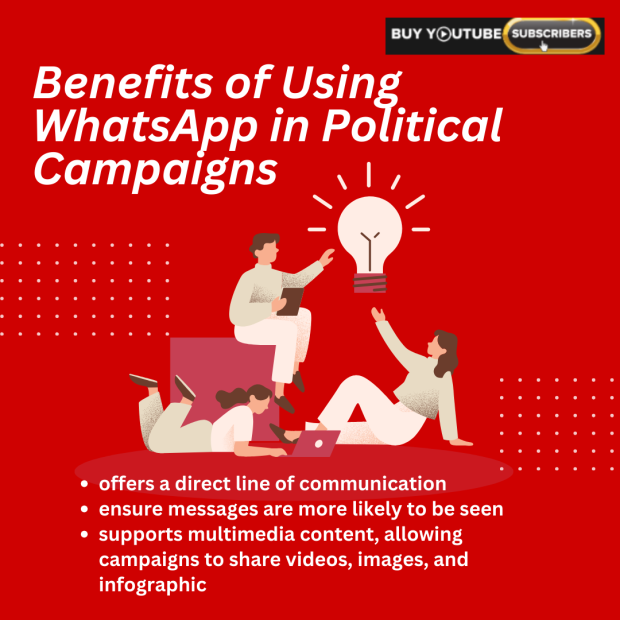
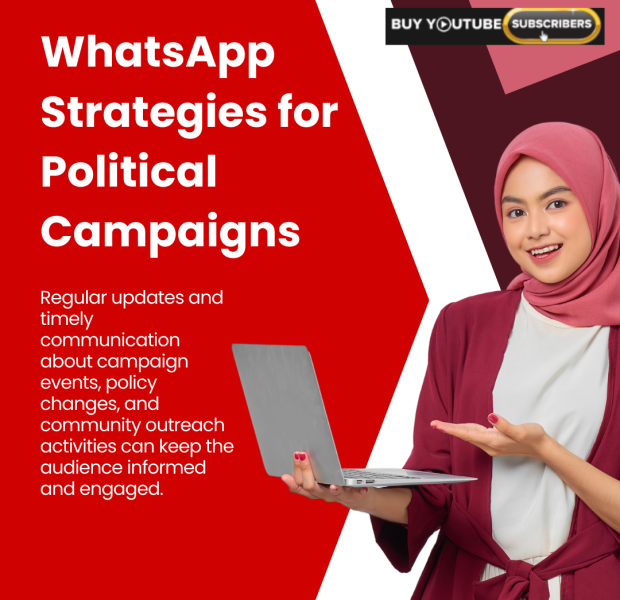
WhatsApp Strategies for Political Campaigns
Effective strategies can amplify WhatsApp marketing’s impact on political campaigns. Regular updates and timely communication about campaign events, policy changes, and community outreach activities can keep the audience informed and engaged. Additionally, polls and surveys can help gauge voter sentiment and encourage two-way communication, fostering a sense of involvement among constituents.
Incorporating interactive elements, such as polls and surveys, is another powerful strategy. These tools can gauge voter sentiment on critical issues, allowing campaigns to tailor their messaging and initiatives accordingly. By inviting constituents to share their opinions, campaigns can foster a two-way communication channel, making voters feel valued and heard.
Additionally, using WhatsApp to create focused groups can facilitate targeted discussions around specific topics or demographics, enabling more personalized engagement. For instance, campaigns can establish groups for youth voters, senior citizens, or local community members to address their unique concerns and interests.
Furthermore, sharing multimedia content—such as short videos, infographics, and testimonials—can enhance engagement by making information more relatable and digestible. Finally, leveraging WhatsApp’s broadcast feature allows campaigns to send messages to multiple contacts simultaneously, ensuring crucial updates reach a broad audience without being overwhelming. By implementing these strategies, campaigns can build a robust and engaged voter base.
How to Use WhatsApp for Voter Mobilization?
Mobilizing voters through WhatsApp requires a strategic approach. Essential steps include sending reminders about upcoming elections, sharing information on polling locations, and providing details about voting procedures. Encouraging users to share information within their networks can further amplify outreach efforts. Additionally, organizing grassroots events via WhatsApp can facilitate community engagement and increase voter turnout.
Additionally, it is crucial to share clear information on polling locations and voting procedures. Providing step-by-step guides, including what identification is needed and the hours of operation, can alleviate confusion and encourage voters to head to the polls.
Encouraging users to share this information within their networks can further amplify outreach efforts. By empowering supporters to act as advocates, campaigns can create a ripple effect, reaching individuals who might not be on the campaign’s direct communication list.
Organizing grassroots events through WhatsApp can also enhance community engagement. Creating events for phone banking, door-to-door canvassing, or local meet-and-greets allows voters to connect with the campaign. Furthermore, utilizing WhatsApp groups for organizing and collaboration can foster a sense of community and belonging, motivating individuals to participate actively.
Overall, leveraging WhatsApp for voter mobilization can increase turnout and create a more engaged electorate, ultimately contributing to the campaign’s success.
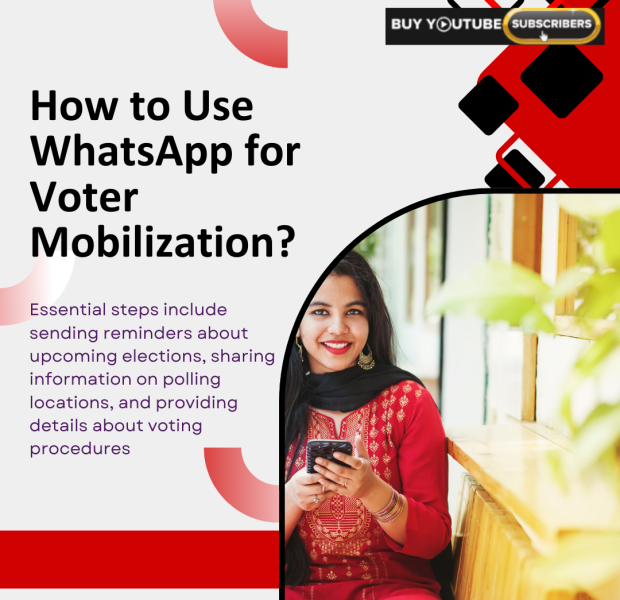
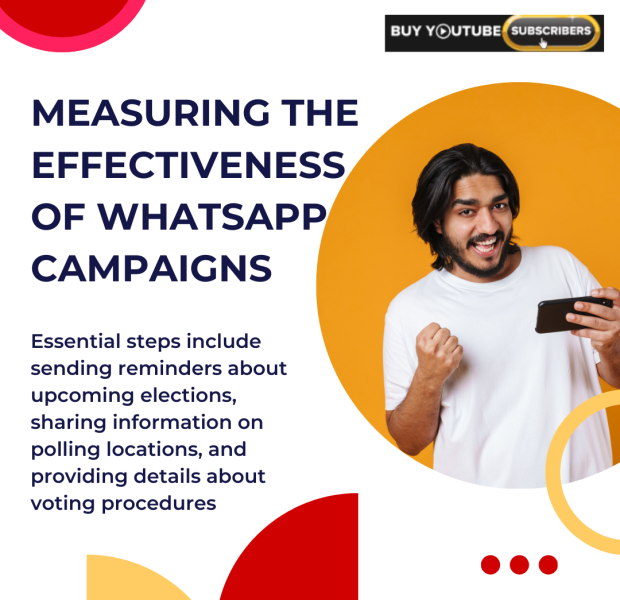
Measuring the Effectiveness of WhatsApp Campaigns
Evaluating the success of WhatsApp marketing initiatives is vital. Key performance indicators (KPIs) such as message open rates, response rates, and engagement levels should be monitored. Conducting post-campaign surveys can also provide valuable insights into voter perception and areas for improvement. Continuous analysis will help refine strategies and maximize future efforts.
Response rates also serve as an important KPI, revealing how many recipients are interacting with the messages. A high response rate can indicate effective communication and engagement, while a low rate may require a reassessment of messaging strategies or content delivery.
Engagement levels, including the number of shares, likes, or comments on multimedia content, provide insights into how well the audience resonates with the campaign materials. Monitoring these metrics allows campaigns to adapt their messaging in real time, ensuring ongoing relevance to constituents.
Conducting post-campaign surveys can further enrich insights by gathering direct feedback from voters about their perceptions and experiences. This qualitative data can highlight strengths and areas for improvement, offering valuable guidance for future initiatives.
By employing continuous analysis of these metrics, campaigns can refine their approaches, ensuring that WhatsApp Marketing for Political Campaigns remains effective and engaging. This iterative process enhances the overall impact of voter outreach efforts and drives greater participation.
Building a Target Audience on WhatsApp
Building a targeted audience is crucial to maximizing the effectiveness of WhatsApp marketing for political campaigns. Start by collecting phone numbers through campaign events, online sign-ups, and social media promotions. It is important to ensure that all interactions are compliant with privacy regulations. Once a database is established, segment the audience based on demographics, interests, and engagement levels. This segmentation allows for personalized messaging that resonates with specific voter groups.
Types of Content for WhatsApp Political Campaigns
Diverse content types can enhance WhatsApp marketing’s effectiveness. Short videos introducing candidates, live Q&A sessions, and behind-the-scenes glimpses of campaign activities can create a more personal connection with voters. Infographics summarizing key policies or achievements can also inform and engage the audience. Ultimately, the content should be tailored to reflect the campaign’s voice and goals.
WhatsApp Automation Tools for Political Campaigns
Automation tools can streamline WhatsApp marketing and political campaign efforts. These tools allow for scheduled messages, automated responses, and data collection, enabling campaigns to maintain consistent communication without overwhelming staff. Utilizing chatbots can also provide instant answers to common voter inquiries, enhancing the user experience and ensuring that voters feel valued.
Legal Considerations for WhatsApp Marketing in Political Campaigns
Navigating legal considerations is critical when employing WhatsApp Marketing for Political Campaigns initiatives. Compliance with data protection laws, such as GDPR, is mandatory. Obtaining explicit consent from users before sending messages is essential to avoid legal repercussions. Ensuring transparency about data usage and privacy will build trust with constituents.
Boosting Political Campaign Engagement with WhatsApp Stickers
Using creative elements like stickers can add a fun and engaging dimension to Political Campaign marketing. Custom stickers can be designed to promote campaign themes, slogans, or important messages, encouraging users to share them with friends and family. This viral potential can increase visibility and engagement among constituents, enhancing overall campaign reach.
WhatsApp Group Moderation Techniques for Political Campaigns
Effective moderation of WhatsApp groups is essential for maintaining a constructive environment. Setting clear guidelines for group behavior and encouraging respectful discourse can help manage discussions. Active moderation can prevent misinformation from spreading and ensure that conversations remain focused on relevant campaign topics. Our company prioritizes creating a positive space where voters feel comfortable engaging with the campaign.
Encouraging respectful discourse is another vital component of successful moderation. Campaign representatives should actively promote a culture of openness where all voices are heard and valued. This can be facilitated through regular prompts that invite group members to share their thoughts and experiences related to campaign issues.
Active moderation is vital to preventing misinformation from spreading. Campaign leaders should closely monitor discussions, quickly addressing any inaccuracies or harmful narratives that may arise. This not only preserves the integrity of the conversation but also reinforces the campaign’s commitment to transparency and truthfulness.
Additionally, fostering focused discussions ensures that conversations remain productive. Moderators can periodically summarize critical points or redirect conversations that veer off-topic, keeping the dialogue aligned with campaign goals.
Our company prioritizes creating a positive space where voters feel comfortable engaging with the campaign. By employing these moderation techniques, WhatsApp groups can become vibrant platforms for dialogue, enhancing voter participation and fostering community engagement around the campaign.
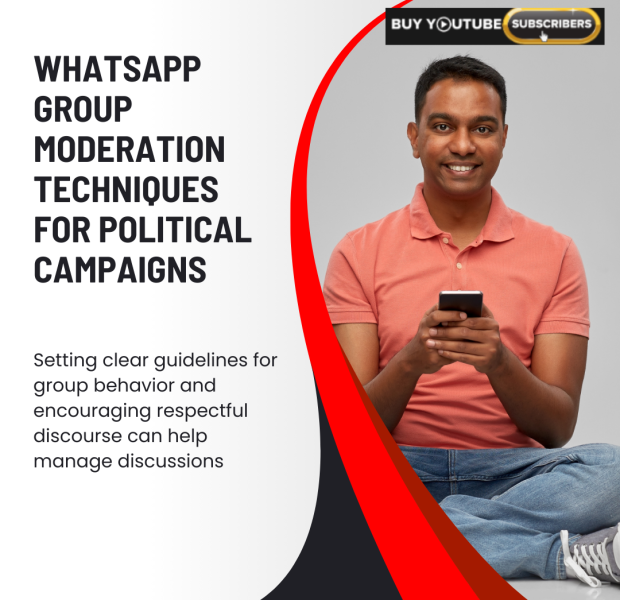
WhatsApp for Political Debate and Voter Dialogue
WhatsApp can serve as a platform for political debate and voter dialogue. Hosting discussions on critical issues allows constituents to voice their opinions and engage directly with campaign representatives. Our company encourages open dialogues that foster understanding and encourage voter participation. Utilizing WhatsApp for this purpose can significantly enhance the democratic process.
Our company actively encourages open dialogues as they foster a culture of understanding and collaboration. By providing a space for voters to ask questions and share their perspectives, campaigns can demonstrate responsiveness and adaptability. This approach can help identify pressing issues that matter to the electorate, allowing candidates to tailor their messages accordingly.
Additionally, utilizing WhatsApp for real-time discussions can enhance the democratic process. It allows for quick dissemination of information, enabling voters to stay informed on current topics and campaign positions. Moreover, campaigns can organize live Q&A sessions or virtual town halls, inviting constituents to participate directly from their phones.
By fostering these conversations, WhatsApp not only strengthens voter engagement but also cultivates a more informed and active electorate. Ultimately, leveraging this platform for political debate enriches the democratic experience, encouraging participation and dialogue that can shape the future of the community.
Role of WhatsApp in Political Micro-Targeting
WhatsApp plays a pivotal role in political micro-targeting. By leveraging data analytics, campaigns can send tailored messages to specific voter segments based on their preferences and behaviors. This precision allows for more effective communication, ensuring that the right messages reach the right audiences at the right time.
For example, campaigns can segment their audience based on factors such as age, location, or past engagement with campaign materials. This allows them to send personalized content—such as targeted policy information, event invitations, or reminders—designed to appeal directly to each segment’s interests. By addressing the unique concerns of different voter groups, campaigns can foster a sense of connection and increase the likelihood of engagement.
Additionally, WhatsApp’s real-time nature allows campaigns to adjust their strategies quickly based on immediate feedback and interactions. If a particular message resonates well with a segment, campaigns can amplify that message across the same group, maximizing its impact.
Furthermore, WhatsApp’s group feature can facilitate targeted discussions, allowing for focused dialogue among specific voter demographics. This creates an environment where constituents feel valued and understood, ultimately driving higher levels of engagement and support. By utilizing WhatsApp for micro-targeting, campaigns can enhance their outreach efforts and strengthen voter relationships.
